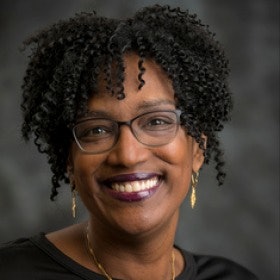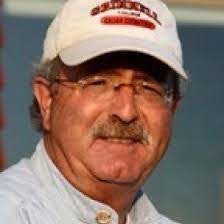Grinnell College professors William Freeman and Dr. Kesho Scott seem like an unlikely pair.
Freeman, a former international athlete who became a track and field coach and teacher of sports psychology described Scott, a former Black Panther who became a scholar of sociology, as “not somebody I would’ve probably reached out to on campus. I didn’t see anything in common with her.”
Scott felt the same way. “What would motivate me to talk to some white boy over in the gymnasium?” she thought. But the two have partnered on one of Grinnell’s most unique courses—a class called The Journey Within that centers student self-exploration. It is perhaps the only American studies class in the world that has “appreciating and loving our core selves” as a key tenant.
 Dr. Kesho Scott, professor at Grinnell College
Dr. Kesho Scott, professor at Grinnell College
“The thing that struck me most was that she was also a seeker,” said Freeman. “It was an immediate recognition that she, too, is on the path and looking for answers.”
Scott was recognizing Freeman in her own way, realizing that “he ain’t no average white dude,” as she put it in a talk delivered to Grinnell alumni.
That initial meeting led to another, this one for four hours. Soon, they were spending whole days together and brainstorming for what would become the Journeys courses.
“We began to realize that if we, as old folks, had come to a reckoning with our own selves, certainly young people would too,” said Scott. “And we wanted them to begin that process of the inner journey earlier than we did. We didn’t want them to wait ‘til they got in their 50s and 60s to begin to ask themselves the critical and difficult questions.”
Scott and Freeman found that journeys of the self, like those that they had taken, were threaded throughout U.S. history.
“We drew on the fact that we weren’t the first Americans to think about that,” said Scott. “The transcendentalist movement did inner work before the Civil War. They were asking questions of, what are they responsible for? What’s in the way of making change? They were doing the same reflection.”
The Journey Within course uses some non-traditional methods. Each class begins with a meditation, and, at various times, students use drawing, haiku, and even body motions to understand the subject matter. The professors had to make sure that the class wasn’t misperceived.
“[We] were a little wary at first in proposing this course because we were afraid that people might see it as a woo-woo experience,” said Scott. “We had to make the argument that this was a rigorous part of a curriculum around American studies.”
But students also delve deeply into canonical thinkers like Nietzsche and Thoreau, connecting them to their own inner journeys. One example was Maya Sciaretta, a sophomore majoring in religious studies who found comfort in the transcendentalists.
“There’s something reassuring about reading people who are questioning the same things as you are, but over a century ago,” she said. “Even though we’re living in a society that’s been industrialized for quite a long time, I still think there are a lot of tensions between living in a fulfilling way and existing in this capitalistic society.”
The ultimate goal, according to both teachers, is not knowledge, but wisdom.
“Wisdom is a longer-term process,” said Freeman. “It’s experiential. It’s taking knowledge and using it.”
Gaining that wisdom is a challenge that requires a high level of introspection, said Theo Richter, a junior studying music.
“If you’re taking [the course] because you think it’ll be easy, this is not the class for you,” he said. “You need to really be prepared to be vulnerable and open up and embark on some real self-exploration.”
Sciaretta agreed.
“This was the most personal I had ever been encouraged to get in a class, especially one of that size, 18 students,” she said.
 William Freeman, professor at Grinnell College
William Freeman, professor at Grinnell College
“We shared things with the class that I don’t think we’ve ever shared with anybody—things that we’re not proud of, growing up,” said Freeman.
“We admitted our academic, professional, marital, spiritual shortcomings to our students,” said Scott. “And that humanized us.”
She thought that the relationship between her and Freeman also played a role.
“They see the love and affection and respect that we have for each other in this joint teaching,” she said. “Some of them haven’t seen it across racial lines, across gender lines, and that is touching to them.”
Whatever the reason, students report coming away from the class with deeply personal realizations. Sciaretta says that the class taught her the power of communal vulnerability.
“I thought that being alone was the only way that one could reflect,” she said. “But I think taking this course really showed me the power of discussion. I learned that I don’t have to go through anything alone, and that I’m not the only person who feels like things in their life need to change.”
Hannah Biles, a senior studying Spanish and sociology, came to a similarly profound understanding. Biles had been sexually abused as a child and had come to feel that her voice didn’t matter, a feeling that manifested in selective mutism.
“[The course] reaffirmed that I have a voice and the power to express that voice,” she said. “Being able to have a place to express myself, especially in writing, and being able to talk about life journeys has been very empowering to me.”
Scott and Freeman are currently planning a version of the course for Grinnell alumni in 2024. They are also beginning work on the fourth undergrad edition, which will include a two-week walk of the Camino de Santiago in Spain, a classic pilgrimage journey.
Richter sees a course like Journeys as necessary in a stressful environment like Grinnell.
“Things move quite fast here and there’s a big emphasis on excellence and rigor,” he said. “That leads to a lot of us students just spinning around a hamster wheel that’s moving too fast for us to ever step off. To be given the space and the opportunity to do that reflection while getting four credits is pretty tremendous.”
Sciaretta appreciates the progress that she and her fellow students made together.
“A favorite thing was being able to watch my classmates become more comfortable with contributing because I was, too,” she said. “It was really nice to feel like we were all learning and growing together. We’re all bonded in a very specific way because of the nature of the class.”
Freeman and Scott are proud, as well.
“[The students saw] the political and private and intimate as part of their educational experience,” said Scott. “That was profound to me.”
“What developed over the semester was absolutely remarkable,” said Freeman. “Our goal was to help them find their authentic self and accept their authentic self. And it worked.”
Jon Edelman can be reached at [email protected]





















